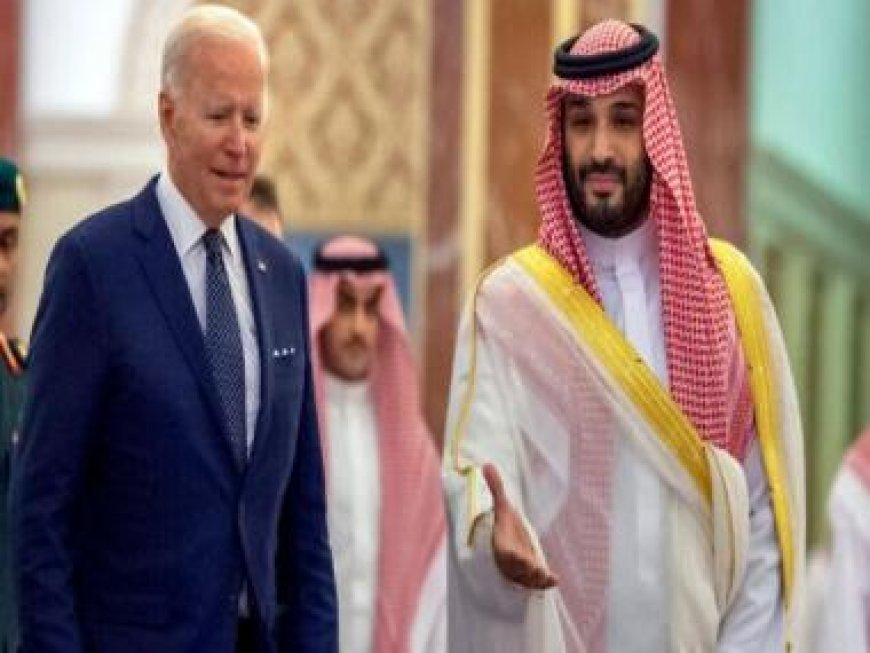Saudi Arabia wants defence pact with US ahead of Prez polls; willing to accept ‘Israeli commitment’ to Palestinian state
Saudi Arabia wants defence pact with US ahead of Prez polls; willing to accept ‘Israeli commitment’ to Palestinian state

Saudi Arabia is working hard to get a defence pact with Washington before the US presidential elections 2024, scheduled in November. This agreement would involve the US military providing protection to the world’s biggest oil exporter in exchange that Riyadh would accept a political commitment from Israel to create a Palestinian state.
The talks with US on forging closer defence ties was resumed by Saudi Arabia recently after a hiatus due to the Israel-Hamas war in October last year.
A Bloomberg report citing people aware of the matter as saying that Crown Prince Mohammed Bin Salman and US senators held discussions in the town of Alula in northwestern Saudi Arabia earlier this month. On the agenda was a revival of earlier negotiations about a defence pact that would also have included a historic tie-up between Saudi Arabia and Israel, they added.
A Reuters report cited two senior sources in Saudi Arabia saying officials from the West Asian nation have informed their US counterparts that Riyadh would not insist Israel take concrete steps to create a Palestinian state and instead would accept a political commitment to a two-state solution.
Regional sources further said Saudi Arabia is very much interested in enhancing its security and ward off threats from rival Iran so it can forge ahead with the ambitious plan to transform its economy as well as lure more foreign investment.
Why Saudi Arabia wants defence pact ahead of US presidential polls?
Riyadh’s diplomatic efforts are motivated by a strategic goal to secure a deal while the Democrats maintain control in the White House and Senate. The increasing apprehension about Iran’s military influence, evident through its proxies in neighbouring countries such as Iraq, Yemen, Lebanon, Syria, and Gaza, is a significant driver behind Saudi Arabia’s push.
Historically, Democratic lawmakers have opposed such agreements, criticising Riyadh for its military involvement in Yemen, influence on oil prices, and its perceived role in the 2018 killing of journalist Jamal Khashoggi. However, given President Biden’s inclination towards a deal, there is a perception within Saudi circles that the current political landscape presents the best opportunity to navigate an agreement through Congress.
While Saudi officials have not specified the details of an acceptable “pathway” to a Palestinian state, this ambiguity provides them flexibility to negotiate a deal with Israel that may not involve concrete and binding measures, Reuters mentioned sources familiar with Saudi perspectives as saying.
How will Saudi-US pact be beneficial?
If finalised, the Saudi-US pact is expected to reshape West Asia by uniting two arch rivals and binding Riyadh to Washington at a time when China is making inroads in the region.
A normalisation deal would also give fillip to Israel’s defences against long-time foe Iran and give US president Joe Biden a diplomatic victory to vaunt ahead of the presidential election scheduled for 5 November.
The report quoted one of the regional sources saying the Saudi officials have privately urged Washington to ask Israel to end the Gaza war and commit to a “political horizon” for a Palestinian state, stating that Riyadh would then normalise relations and help fund Gaza’s reconstruction.
“The message from the kingdom to America has been: ‘Stop the war first, allow humanitarian aid and commit to a just and lasting solution to give the Palestinians a state’,” Abdelaziz al-Sagher, head of the Gulf Research Center think-tank in Jeddah, who is familiar with the ongoing discussions, said.
“Without it, Saudi Arabia can’t do anything,” Abdelaziz al-Sagher added.
There lies a problem
The pact might face problems as Israeli prime minister Benjamin Netanyahu, who has spent much of his political career opposing Palestinian statehood, has been persistently rejecting any US and Arab aspirations for a Palestinian state once the Israel-Hamas war is over.
“Normalisation does require really – if not legally, at least politically – a commitment from the Israelis that they are open to a two-state solution,” Reuters quoted one of the senior regional sources familiar with Saudi thinking as saying.
“If Israel stopped its military offensive on Gaza – or at least declared a ceasefire – it would make it easier for Saudi Arabia to go ahead with the deal,” the person added.
With inputs from Reuters
What's Your Reaction?



























































